
I met Lisa Russell, an Enneagram coach and spiritual counselor, for drinks a few weeks ago. Before meeting, I had thought we would discuss how each Enneagram type practices hospitality.
“Why don’t we talk about how we can show hospitality to each Enneagram type instead?” she suggested, taking a sip of her drink. “That seems less self-focused and more empathetic to me.”
Lisa described the Enneagram types as differing shades on a color palatte—there can be many shades of blue, green, and grey.
We often know about ourselves, but what happens when we become students of others?
How does this transform our communication, community, and hospitality to each Enneagram type? Here are some ideas for understanding and loving individuals as we show hospitality to each Enneagram type in our life (along with a collection of quotes from some of my social media friends.)
Type 1: The Reformer (rational, idealistic, perfectionistic, principled)
According to Lisa, this type is caught up in “holy goodness.” They believe God is good and they want to be right. They have a strong inner influence and the mantra “am I good enough?” often goes through their minds. Type Ones often hold themselves to a higher standard. To welcome a One to your home, have things structured and lined up for them.
M.W. : “Invite me into your fun. Help me play!”
Jacob Robinson: “Showing “hospitality” to a One is a tough ask because of the perfectionist standards. Thus, as a One, I don’t really need “hospitality’ but friendship.”
Annie Rim: “Having a really sweet/personal detail is the best. At dinner, a bottle of wine with a story behind it. As a house guest, a bar of soap or something thoughtful. Anytime someone has done that, I’ve felt especially seen and welcomed.”
Type 2: The Helper (caring, generous, interpersonal, possessive)
As a Type Two herself, Lisa had many thoughts about how to show hospitality to helpers. When you host, Twos are usually the first ones to offer to wash your lettuce or set the table. But sometimes what the Two needs is permission to receive instead of give. They sometimes need to be given “space and time to recharge and rejuvenate and have solitude.” They want to be able to serve out of overflow, not obligation. They want to feel loved for being, not doing.
Andi Cumbo-Floyd: “Hospitality to me is often making it known that I’m wanted just for me, not for the help I can bring.”
Abby Norman: “Either give me a task or tell me everything is taken care of.”
Tanya Marlow: “I like it when people give me quality time and we have a chat about emotions and Real Stuff. I also like it when people ask me for wisdom that will help them out, especially if they’re in crisis. “
Type 3: The Achiever (success-oriented, driven, image-conscious)
To show hospitality to a Three, Lisa advised being punctual and sticking to the set time. Threes get antsy with inefficiencies in gatherings. They appreciate being praised and affirmed for what they can bring to the table. Lisa mentioned a dinner she attended where the host prepared name cards in advance. On the back of each card, the host had written encouragement in the form of “I see this in you” for each specific person. Lisa thought the Type Three would feel especially loved by this gesture.
Sue Fulmore: “The times I have felt most seen and loved is when someone asks questions which help me get more in tune with my emotions. Those people that listen with their whole heart and seek to understand me – this is where I feel most welcome.”
Marci Yoseph: “I want you to sit with me and give me the space/time to sit and relax. If you are up doing stuff I feel obligated to be up and productive too. I need permission to just sit.”
Type 4: The Individualist (sensitive, expressive, dramatic, self-absorbed)
Type Fours “feel all the feels.” Lisa recommended allowing Fours the space and freedom to experience their feelings without shame. They often long for the space to express themselves and have perhaps experienced rejection for their sensitivity. To show hospitality to a Type Four might look like inviting them to share their unique gifts.
F.J. : “Take time to understand me. Be happy to see me. Pursue me. No small talk—only meaningful talk.”
A.M. : “Ask me questions and listen well. Put pretty flowers in my room.”
Type 5: The Investigator (cerebral, perceptive, innovative, isolated)
Lisa said the best way to show hospitality to a Five is to give them space. They tend to be more introverted and sometimes need to isolate and cave up. They appreciate knowing what to expect in advance. They often need to get to a meeting early and observe. But just because they linger on the margins doesn’t mean they don’t want to be invited.
Adam Verner (my husband): “Hand me a good book and tell me to go into another room by myself for three hours before joining the crowd.”
M.D. : “It’s not always easy to articulate deep feelings when you live in your head 99.99% of the time. Having someone who makes it calm, safe, and ok for you to unravel yourself is critical … I need room and empathy to unravel and rewind and figure it out. I need demonstrated empathy which often can mean a strong hug and quality time or asking me specifically about how I am regarding an issue you know I’m struggling with or working through. Presence. I simply need presence.”
Type 6: The Loyalist (committed, security-oriented, responsible, anxious)
Sixes often have a million plans in order to be prepared for the worst case scenario. Lisa mentioned they have the “Mary Poppins bag” of resources “just in case.” They need reassurance that things will be okay. To show hospitality to a Type Six, offer them security, stability, and consistency by following through with promises you make.
A.S. : “Be consistent with invites to hang out. Not with an agenda, but just to chill.”
A.K. : “Consider my children’s needs too. It makes me feel like all of the bases are covered so we can relax and talk.”
Juliana Gordon: “If there is a party, make sure there is plenty of seating so I can make the crowd smaller.”
Cara Strickland: “I love it when people let me know what to expect in advance/anticipate concerns I might have.”
Type 7: The Enthusiast (busy, fun-loving, spontaneous, scattered)
Lisa described this type as the “Joyful Epicurean.” She said they love to go all out and indulge. They are always worried they’ll be deprived and often suffer from FOMO (Fear of Missing Out). What Type Sevens need from their hosts is permission to be spontaneous and fun-loving. They want friends to join them in their joyful spontaneity.
Jamie Bagley: “Let me know it’s okay to curl up on the sofa with a blanket or prop my feet up. Also, offering me tea and talking about all things quirky or deeply philosophical is the way to my worn out heart. Cookies help, too.”
Roxanne Engstrom: “I love when families from other cultures invite me to go places with them or do things that they are doing to celebrate religious or cultural moment. And my love language is also food, lots of ethnic food.”
Type 8: The Challenger (self-confident, confrontational, decisive, willful)
Type Eights are strong and powerful. They appreciate honesty and “have a nose to sniff out BS,” Lisa said. They don’t like empty flattery or appreciate people gushing over them. To show hospitality to a Type Eight might look like giving them an opportunity to lead and make decisions. They enjoy people bringing confrontation into the group and feel it’s live-giving.
Courtney Skiera-Vaugn: “If someone were to just take charge and allow me not to have to lead – start the convo, have coffee ready, show up and serve without me asking or even agreeing to (a dear friend did this the other day knowing I was super busy, she showed up, took my kids, loaded my dishwasher and made me coffee IN MY HOME.)”
E.D.: “Invite me into a trusting environment. A few friends goes a lot further than a ton of people.”
Type 9: The Peacemaker (easygoing, agreeable, complacent, people-pleaser)
Lisa said Nines are similar to Sixes in that they need to know that they will be okay. They often camouflage themselves and blend in to please others, so they may need to be drawn out with questions like, “What do you really think?” They may need prodding to do something that engages their body like hiking or going for a walk.
Mallary Covington: “People can show hospitality to me by engaging in good conversations. I love asking good questions and listening, and also love it when people ask me good questions and listen to me in return. Something that makes me feel super disconnected from others is when people ask questions but don’t actually want a real answer. Also, keeping an environment low key and low stress really makes me feel welcome and comfortable.“
A.U.: “Make me know I’m really wanted there and that you are ok with me being there. I crave deep conversations, however I always worry that if I talk about something deeper than the weather that I’m rocking the peace.”
***
Although we are each unique, most of the responses I heard sang a similar tune. Most people feel loved when they are welcomed to be themselves. To do this, we put aside our phones and encourage our guests to relax. We arrange smaller groups, ask good questions, and listen for the answers. We affirm our belief that the person we are talking to right then is the most engaging and important person in the room.
About Lisa Russell:

Lisa is a spiritual counselor and Enneagram coach at Restoration Counseling in Fort Collins, Colorado. She teaches large group workshops and team and individual counseling on the Enneagram. Visit the Restoration Counseling website for more details or to sign up for an Enneagram coaching session.
More on the Enneagram:
Enneagram Institute Website (has a test and descriptions of the different types)
That Sounds Fun Podcast with Annie Downs series on the Enneagram
The Sacred Enneagram: Finding Your Unique Path to Spiritual Growth, by Christopther L. Heuertz
The Road Back to You: An Enneagram Journey to Self-Discovery, by Ian Morgan Cron and Suzanne Stabile
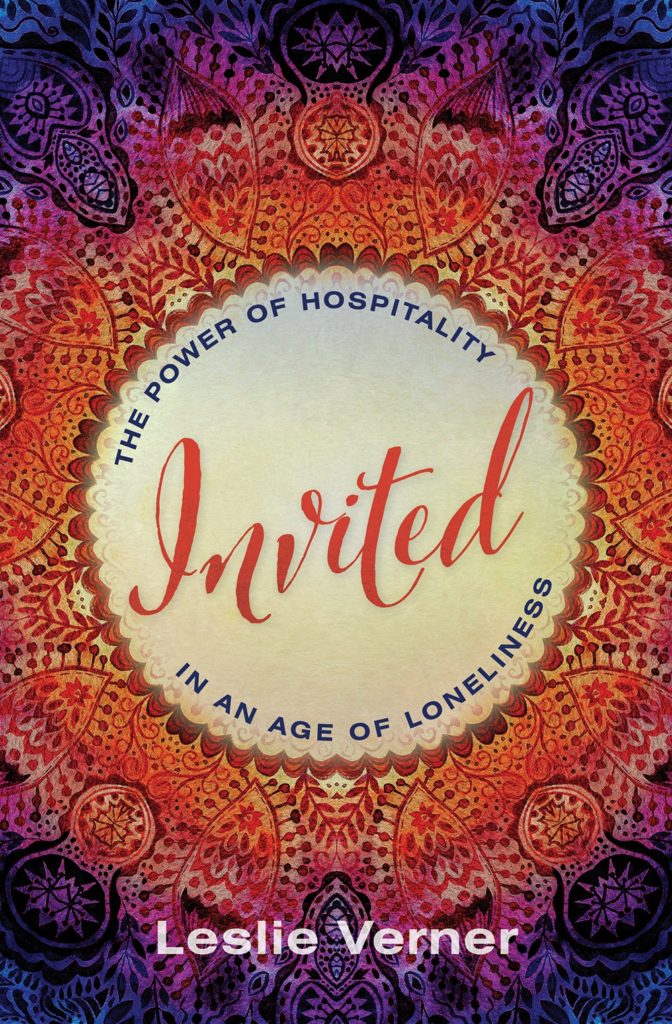
Invited: The Power of Hospitality in an Age of Loneliness releases August 13. Pre-order now and you will be eligible for some outstanding pre-order bonuses.
Sign up for my newsletter and I’ll send you Chapter 1 of Invited: The Power of Hospitality in an Age of Loneliness:
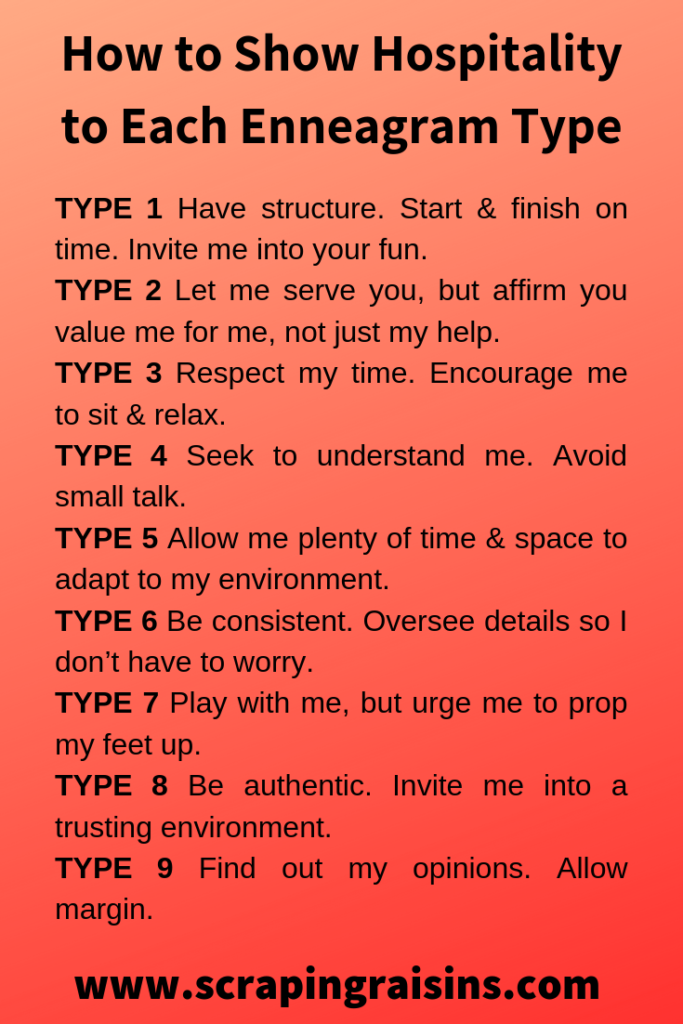
**This post contains Amazon affiliate links




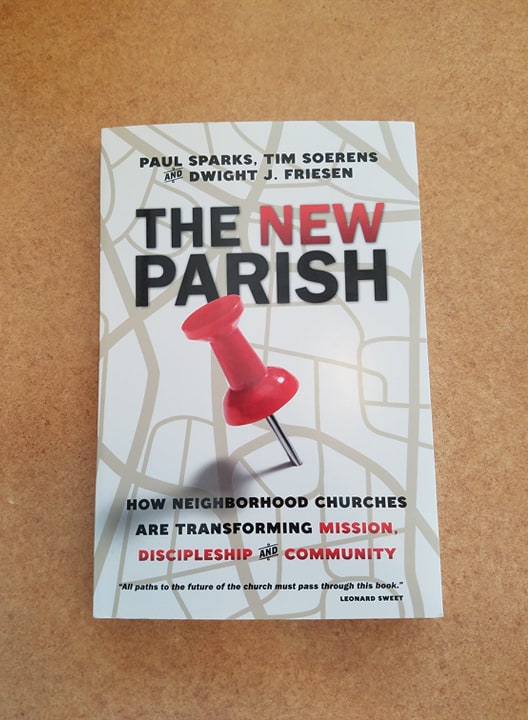
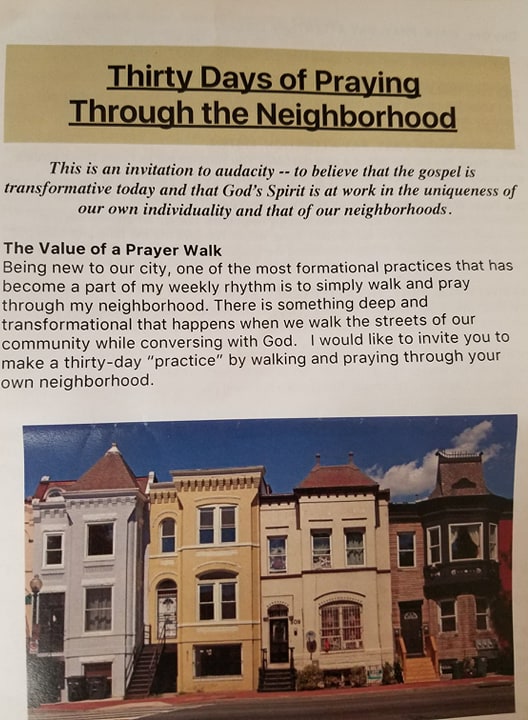
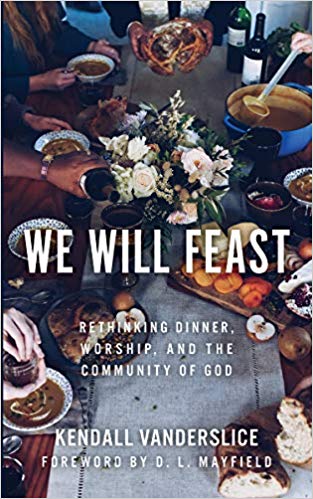
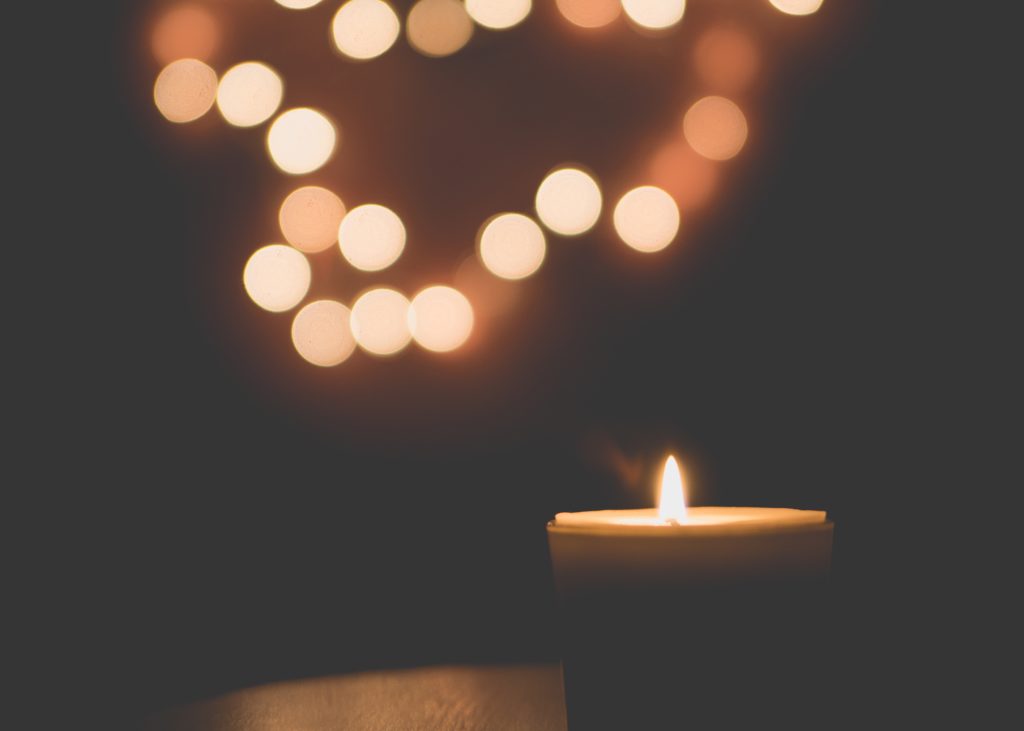
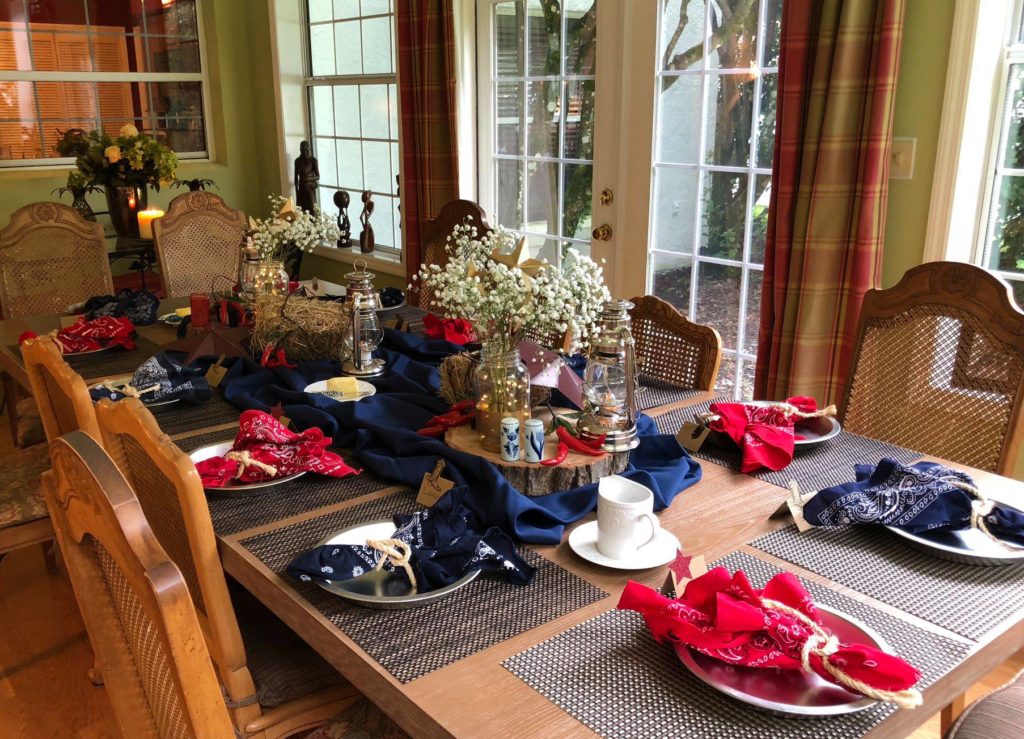
 Judy Douglass is a writer, editor, speaker, encourager. She partners with her husband, Steve, to lead Campus Crusade for Christ (Cru) globally. She writes at
Judy Douglass is a writer, editor, speaker, encourager. She partners with her husband, Steve, to lead Campus Crusade for Christ (Cru) globally. She writes at 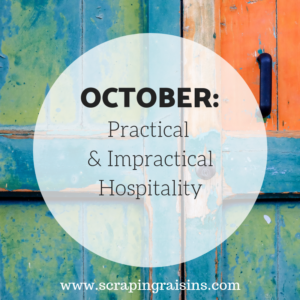 This month on Scraping Raisins we’re talking about practical and impractical hospitality. Be sure to follow along on my social media channels (buttons on top right of website) and
This month on Scraping Raisins we’re talking about practical and impractical hospitality. Be sure to follow along on my social media channels (buttons on top right of website) and 
 Sarah loves words. She also loves people. And she loves weaving them together in honest and vulnerable ways that cut underneath the surface and break open the longings of the heart. She is a writer whose words breathe vulnerability and hope into longing souls. Sarah is a director for a nonprofit student center, writes for numerous international ministries, is a member of Redbud Writers Guild, and invites readers to sit with her awhile at
Sarah loves words. She also loves people. And she loves weaving them together in honest and vulnerable ways that cut underneath the surface and break open the longings of the heart. She is a writer whose words breathe vulnerability and hope into longing souls. Sarah is a director for a nonprofit student center, writes for numerous international ministries, is a member of Redbud Writers Guild, and invites readers to sit with her awhile at 
 Despite a deep desire to belong, Nicole Woo often finds life nudging her to the margins. She’s been the only girl on the team, the only public speaking teacher afraid of public speaking, the only Caucasian in the extended family photo, and the only mom who lets her kids drink Fanta. She calls the Rockies home, often pretending to be a Colorado native in spite of her flatland origins. Visit her blog at
Despite a deep desire to belong, Nicole Woo often finds life nudging her to the margins. She’s been the only girl on the team, the only public speaking teacher afraid of public speaking, the only Caucasian in the extended family photo, and the only mom who lets her kids drink Fanta. She calls the Rockies home, often pretending to be a Colorado native in spite of her flatland origins. Visit her blog at 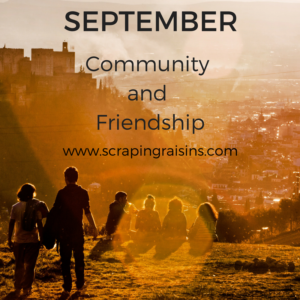 This month on Scraping Raisins we are talking about Friendship and Community. Be sure and subscribe to my newsletter or follow on social media so you don’t miss a post!
This month on Scraping Raisins we are talking about Friendship and Community. Be sure and subscribe to my newsletter or follow on social media so you don’t miss a post!
 Afton Rorvik savors words, flavored coffee, time outside, and living connected. Although an introvert, she has come to realize that what really matters in life is people and faith in Jesus, which gives her strength and courage to live connected. She is the author of
Afton Rorvik savors words, flavored coffee, time outside, and living connected. Although an introvert, she has come to realize that what really matters in life is people and faith in Jesus, which gives her strength and courage to live connected. She is the author of 

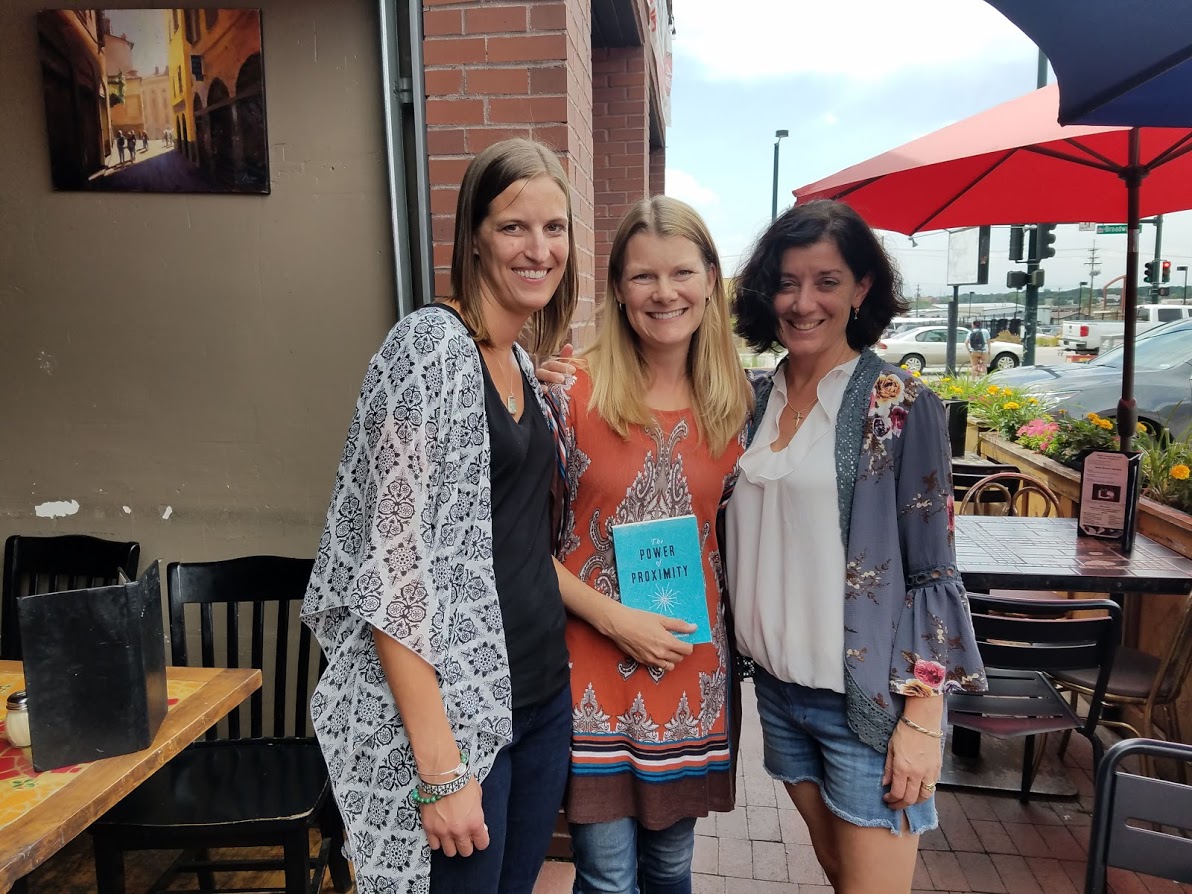
 Michelle Ferrigno Warren is the advocacy and policy engagement director for the Christian Community Development Association. She is an immigration, education, and human service policy specialist and is an adjunct faculty member at Denver Seminary. With over twenty years experience working in Christian community development, Michelle is a part of the national Evangelical Immigration Table and helps consult for the National Immigration Forum. She is a founding staff member of Open Door Ministries, a large community development corporation. Michelle, her husband, David, and their three children live in an immigrant neighborhood in Denver, Colorado.
Michelle Ferrigno Warren is the advocacy and policy engagement director for the Christian Community Development Association. She is an immigration, education, and human service policy specialist and is an adjunct faculty member at Denver Seminary. With over twenty years experience working in Christian community development, Michelle is a part of the national Evangelical Immigration Table and helps consult for the National Immigration Forum. She is a founding staff member of Open Door Ministries, a large community development corporation. Michelle, her husband, David, and their three children live in an immigrant neighborhood in Denver, Colorado. We’re giving away a FREE copy of Sarah Quezada’s book,
We’re giving away a FREE copy of Sarah Quezada’s book,  The theme for August is “Homelessness, Refugees & the Stranger.” Follow along on social media (links in upper right) to keep up with the latest posts or sign up for the newsletter below for links to the most recent blog posts, thought-provoking articles from the web, and a few of the things I’m into these days.
The theme for August is “Homelessness, Refugees & the Stranger.” Follow along on social media (links in upper right) to keep up with the latest posts or sign up for the newsletter below for links to the most recent blog posts, thought-provoking articles from the web, and a few of the things I’m into these days.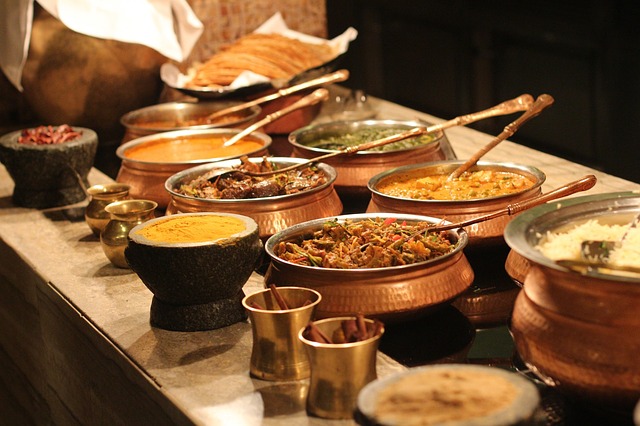
 Mary Grace Otis is a writer, editor, and podcaster who lives with her husband and three boys in northern Michigan. You can find her podcast and posts at
Mary Grace Otis is a writer, editor, and podcaster who lives with her husband and three boys in northern Michigan. You can find her podcast and posts at  We are giving away a copy of
We are giving away a copy of 

 Debbie loves, learns and lives in the East End of Glasgow, Scotland with her husband and two wee boys. People, food and stories are her favourites, preferably combined. She writes at
Debbie loves, learns and lives in the East End of Glasgow, Scotland with her husband and two wee boys. People, food and stories are her favourites, preferably combined. She writes at